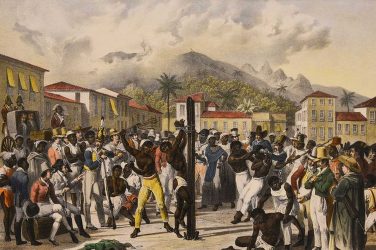Brazilian Federal Police launched an anti-human trafficking campaign on December 14 featuring a short film that highlights the dark reality of human trafficking crime in Brazil. The video went live on the Federal Police’s Instagram account and has garnered 185,000 views and more than 8,000 likes in a week.
Told from the perspective of a Brazilian Federal Police officer, the video shares examples of common human trafficking situations – the sexual exploitation of a 13-year-old girl who’d been promised a modeling career, the purchase of a three-year-old boy to pose as a stranger’s child while illegally entering the U.S., organ trafficking, forced sex acts with children in online exploitation and more.
The video encourages viewers to “Dial 100,” Brazil’s Human Rights Hotline, if they witness signs of human trafficking or are experiencing exploitation themselves. The hotline operates 24 hours a day, seven days a week, as a free service.
According to a release, the campaign’s goal is to educate and inform the public about what human trafficking looks like and how they can assist police in finding survivors and stopping traffickers. The release states that while human trafficking is a very prevalent issue globally, it is oftentimes misunderstood and unrecognized. Nearly 50 million individuals are affected by human trafficking worldwide as of 2022, the International Labor Organization reports.
“When we assess the public’s understanding of human trafficking and consider actions that can be taken to ensure disruption of this crime, we know that general education must play a central role,” said Cintia Meirelles de Azevedo, Brazilian Country Representative for The Exodus Road.
In developing the campaign, the Federal Police collaborated with The Exodus Road, an international, anti-trafficking nonprofit. The nonprofit combats human trafficking through intervention with local law enforcement, training and education, and aftercare services in six countries around the world, including Brazil.
In 2021, the organization teamed up with Cellebrite (Nasdaq: CLBT) to provide an 8-module training curriculum for Brazil law enforcement, which has already impacted the rescue of 164 survivors and the arrests of 20 perpetrators, The Exodus Road reports.
Speaking on the issue in Brazil and the Federal Police’s commitment to combating it, Frederico Ferreira, Chief Head of Service for the Repression of Trafficking in Persons and Smuggling, said:
“The crime of human trafficking has no place in our world. Nevertheless, it affects nearly 50 million people across every country, including right here in Brazil. The Brazilian Federal Police remains committed to combating this crime. In order to bring attention to the realities of human trafficking, we’re partnering with The Exodus Road, an international nonprofit actively supporting intervention operations in our country through the provision of technology and training for law enforcement.”
Alongside the Brazil Federal Police and The Exodus Road, Cellebrite (CLBT) and LATAM Airlines (LTMAY) have also collaborated in this awareness effort. These companies and the Brazilian Ministry of Labor shared the awareness video across their social media channels to help boost the campaign’s reach.
“Human trafficking happens every day, and ending it will require each of us passionately committed to the fight against it,” Chief Ferreira said.













